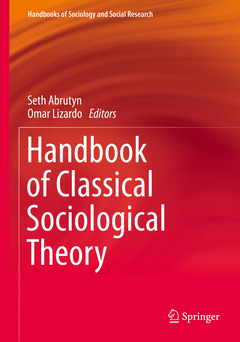Handbook of Classical Sociological Theory, 1st ed. 2021 Handbooks of Sociology and Social Research Series
Coordonnateurs : Abrutyn Seth, Lizardo Omar

Part I. Overarching Questions.- Chapter 1. The Methods and Surprises of Sociological Theory (G.Jasso).- Chapter 2. Modernity as a classical question in sociological theory (C. Silla).- Chapter 3. Evolutionary Theorizing in Sociology’s Formative Period (J. Turner).- Chapter 4. Selfing: Integrating Pragmatism and Phenomenology to Develop a Multi-Processing Theory of the Self (E. Summers-Effler).- Chapter 5. The Sociology of W.E.B. Du Bois (A. Morris).- Part II. Central Dynamics.- Chapter 6. Does Differentiation Matter to Sociology Anymore? (S. Abrutyn).- Chapter 7. Power, Regulation and Social Order in the Intersection of Political and Social Theory (R. Heiskala).- Chapter 8. Hermeneutics and Performance in Social Theories of Power (I. Reed).- Chapter 9. From Simmel to Relational Sociology (S. Mützel ).- Chapter 10. Reflections on Class and Social Inequality: Sociology and Intersectionality in Dialogue (P.H. Collins).- Part III. Spheres of Social Life.- Chapter 11. The Sociology of Kinship (A. Maryanski).- Chapter 12. Mediating the Sacred: Thinking through Religious Experience in the Classics and Beyond (M.Pagis).- Chapter 13. Polity (E. Clemens).- Chapter 14. Theoretical Lineages and Contemporary Concerns in the Sociology of Economic Life (S. Mudge).- Chapter 15. Law in Classical Sociological Theory: Coercion, Ideology, and Change (E. Cornelius).- Chapter 16. Education (J. Guhin).- Chapter 17. Art or the Aesthetic? The Relevance of the Classical Sociology of Art for the Current Sociology of Culture (B. Merriman).- Part IV. Theorizing New Social Forms.- Chapter 18. Urbanization Theorizing (T. Clark).- Chapter 19. Crowds and Collective Behavior (C. Borch).- Chapter 20. Strands of Classical Theory in the Study of Social Movements (D. McAdam).- Chapter 21. Organizations: Theoretical Debates and the Scope of Organizational Theory (N. Fligstein).- Chapter 22. Democracy, Civil Sphere, Mass Society (P. Kivisto).- Chapter 23. The Other as Real, Imagined and Political (C. Decoteau).- Part V. Interactions, Symbols, and Psyche.- Chapter 24. Empathy, Intersubjectivity and the Self (N. Ruiz).- Chapter 25. Symbol Systems and Social Structures (V. Leschziner).- Chapter 26. Consciousness and Unconsciousness (L. Chancer).- Part VI. Identifying Conceptual Threads.- Chapter 27. Enculturing the Classics (O. Lizardo).- Chapter 28. Morality and Sociological Theory (S. Hitlin).- Chapter 29. Cognition, Practice and Learning in the Discourse of the Human Sciences (M. Strand).- Chapter 30. On the Other Side of Interests: The Rise of Values and their Transformation into Disinterest (J. Martin).- Chapter 31. The Cognitive Dimension (S. Turner).
Brings together experts across a variety of sociological subfields to examine central questions, problems, and themes in classical theory
Offers extensive discussions of debates, arguments, and discussions in classical theory and how they have informed contemporary sociological inquiry
Pushes sociologists, instructors, and students to rethink what classical theory offers modern sociology by moving away from the “great man”/ biographical approach to a focus on ideas
Date de parution : 11-2022
Ouvrage de 725 p.
17.8x25.4 cm
Date de parution : 11-2021
Ouvrage de 725 p.
17.8x25.4 cm
Thèmes de Handbook of Classical Sociological Theory :
Mots-clés :
Classical Sociological Theory; History of Sociology; Social Thought; Sociological Inquiry; Spheres of Social Life; Collective Behavior; Democracy and Mass Society; Urbanization; Urbanism; and Community; Stratification and Inequality; Theory and Sociological Methods; Cultural Analysis; Contemporary Sociological Theory; Conventional Classical Pedagogy Theory



